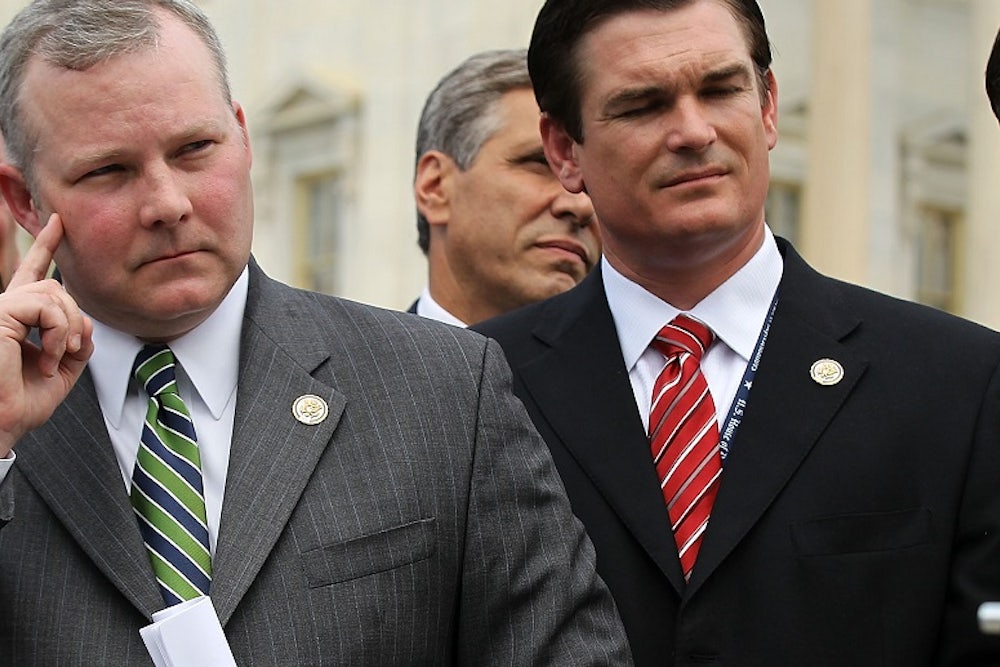On Friday afternoon, retiring Congressman Tim Griffin appeared on "The Doc Washburn Show," a conservative talk radio show, to defend his vote for the government funding bill, the so-called CRomnibus. The right wing, led by senators Ted Cruz and Mike Lee, urged their fellow legislators to oppose it because it did not block President Barack Obama’s executive action on immigration. Griffin swiftly refutes those arguments in one of the most honest interviews you’ll ever hear from a politician.
Griffin begins the segment, which was flagged by BuzzFeed's Andrew Kaczynski, by explaining why an omnibus bill is better than a continuing resolution. “A continuing resolution (CR), which was the alternative here, just says all policies that are in place, we’re just going to continue them at the levels they’re at,” he said. “If you want to change policies—for example the Dodd-Frank provision which the liberals are mad got passed, putting some restrictions on the EPA’s overreach—those sorts of things you can only do, not through a CR, you have to do them through appropriations bills, things called policy riders.” That’s not quite true, of course. Congress can make policy changes through the normal legislative process instead of tacking them onto a must-pass spending bill. But Griffin is right that Republicans earned a number of policy victories in the CRomnibus through policy riders—victories they wouldn’t have gotten with a continuing resolution.
That isn’t enough for conservatives like Doc Washburn, the show’s host, who argued that the GOP should be challenging Obama immediately. “In the meantime though, we’re still funding Obamacare,” he said. “We’re still funding the EPA’s war on coal. We’re still funding amnesty.” Washburn emphatically called a government shutdown over these issues a “fantastic idea.” But this legislative strategy is flawed as well, Griffin explains, as evidenced by the political consequences for the Republican Party after the government shutdown in 2013. You can see how the Republican favorability shot downwards when they shut down the government:

Many on the right have not learned their lesson though. Washburn, for instance, suggests that the shutdown was OK because Republicans did so well in the midterms. Erick Erickson has made similar comments. Griffin, who supported the shutdown in 2013, did learn from that misguided venture. For instance, he immediately shoots down Washburn's argument by explaining that Republicans did not win the midterms because they shut down the government. They won for many other reasons. The election did show that a party can shut down the government and still win an election. But extrapolating anything more from the GOP’s victory is a correlation-causation error. “We won despite the fact that we shut down [the government],” Griffin said. “I don’t think anybody would say ‘Let’s shut down the government so we can increase our majority.’ That doesn’t make any sense.”
Washburn then argued that “you have to choose which hill you want to die on.” In other words, who cares about the political consequences of a government shutdown, Republicans must make the stand on principle. Griffin makes quick work of this argument as well, explaining to Washburn that a funding fight “will consume the House for the first six months of the next year.” After that, Griffin correctly notes, attention will shift to the presidential elections, meaning a shutdown fight would waste the period when the GOP could actually accomplish something. “We have to play chess, not checkers,” he added.
That answer didn’t satisfy Washburn either, who asked why Republicans shouldn’t fight right now instead of in the next Congress. An exasperated Griffin responded, “Because we don’t have a Republican Senate. Why would you fight now?
“A lot of the things that people think they want to do, we talk about,” he added. “But then we count the votes and we go, ‘You know what. There aren’t the votes for that.’”
The entire eight-minute interview is worth your time. You can sense the annoyance in Griffin’s voice, who isn’t exactly a moderate Republican—he has an 80 rating from the American Conservative Union. Griffin becomes most frustrated when Washburn mentions that Louie Gohmert didn’t vote for the CRomnibus. Griffin calls Gohmert “one of the least respected members of Congress” because he goes on television and radio and rallies the far right around a legislative strategy that never was an actual option because “the votes did not exist.”
It’s not uncommon for retiring legislators to open up when they leave office. But Griffin’s political career isn’t over. He was elected the lieutenant governor of Arkansas in November. That makes his honesty all the more refreshing—and makes it even more important that conservatives listen to him.
